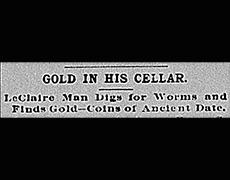
While searching for fish worms in his cellar, Captain Suiter struck upon an iron pot filled with gold coins valued between $200 and $300, alongside two silver coins dated as early as 1818. The gold pieces bear dates up to 1850, leading to spirited speculation about their mysterious origin.
Gold in His Cellar

Le Claire. Sept. 1, 1900. — Capt. Zach G. Suiter, of this place, one of the best known Mississippi river men, who was on the Verne Swain for a number of years, and who is well known here, while digging for fish worms in his cellar Thursday found an iron pot containing between $200 and $300 in gold coin, besides two silver coins, the latest date on the silver being 1818. Some of the gold was coined as late as 1850.
Who buried the treasure is a mystery that will perhaps never be solved. About the time the coin was buried, according to the date, 1850, Le Claire was one of the toughest river towns along the Mississippi, and it is thought some person in trouble buried the money and never returned for it.
The Davenport Leader says of the above discover:
“Not an able bodied male citizen of the sister city of Le Claire can be seen on her busy streets today. The passengers on the D.R.I. & N.W. trains bring reports of a deserted village to the northward. There is no one on the levee to catch the rope and snub up the Verne to the bank, while the reception committee which daily welcomes the City of Winona is today composed of citizens feminine. Even the whoop of the calliope, which is ordinarily enough to bring tears to the eyes of everybody within 40 miles, did not call to the surface one of the burrowing burghers of Le Claire today.
“This condition of affairs has been brought about by the discovery of gold in the stronghold up the river. Le Claire is in active rivalry with Nome and the Klondike fr emigration. In these gold fields the gold is found in the rough and a certain amount of effort is needed to get it into shape for commercial and hoarding purposes. In the Le Claire field the gold is found in iron pots, already minted, milled and dated.
“Yesterday Capt. Zach Suiter was moved to go sit on the river bank and while away a few hours coaxing channel cat and boneless carp out of the river and into the Suiter skillet. He retired to his cellar with a grub hoe to dig some bait. He had stricken but a few licks in the loam of the cellar floor when his implement struck hard. Angle worms with a bony covering being known in Le Claire, he investigated. Two licks with the hoe uncovered the south side of an iron pot. His excavating efforts and perspiration were immediately redoubled. The pot was lifted, examined and the neighbors called in to help wonder and admire. No wonder. The pot was sure enough the traditional pot of gold at the end of the rainbow which Le Claire children have hunted for generations.
“Washed and cleaned, the treasure trove resolved itself into the 12 gold pieces, double eagles, and two silver pieces, half dollars, put in for lagniappe. The news spread. Inside of an hour every cellar flor in Le Claire was being dug over and searched. Where there is one there may be more. If all the miners strike a find there will indeed be a flock of pots – golden pots. While the digging progresses there are surmises as to who put away the treasure. It is not known that Capt. Kidd ever penetrated so far inland. The buccaneers of olden time would hardly seek out the quiet town of Le Claire to establish a private treasure.
“At all events when the dates on the shiners of Capt. Suiter’s find became known such theories were plainly anachronistic. The latest date on the silver was 1818. the gold was minted as late as 1850. The house was at one time used as a saloon. It was erected in 1850.
“What Le Claire people want to know is who put that pot in the cellar and then forgot it. Also, did he put more pots in the other cellars.
“There has been a theory advanced which connects Buffalo Bill with the buried money. He once lived in Le Claire. There is not a man in the place over 22 that was not Billy Cody’s playmate when he was a school boy. Well, Buffalo Bill was always a strong money maker and moreover a notable saver. This is perhaps a segment of the fortune that he has laid up against a rainy day. When Mr. Cody reaches here next Monday he will learn with chagrin of the Suiter unearthing of his first savings. By the way, was it not a Suiter that discovered the first gold in California?”
Source: Evening times-Republican. (Marshalltown, Iowa), 01 Sept. 1900.

